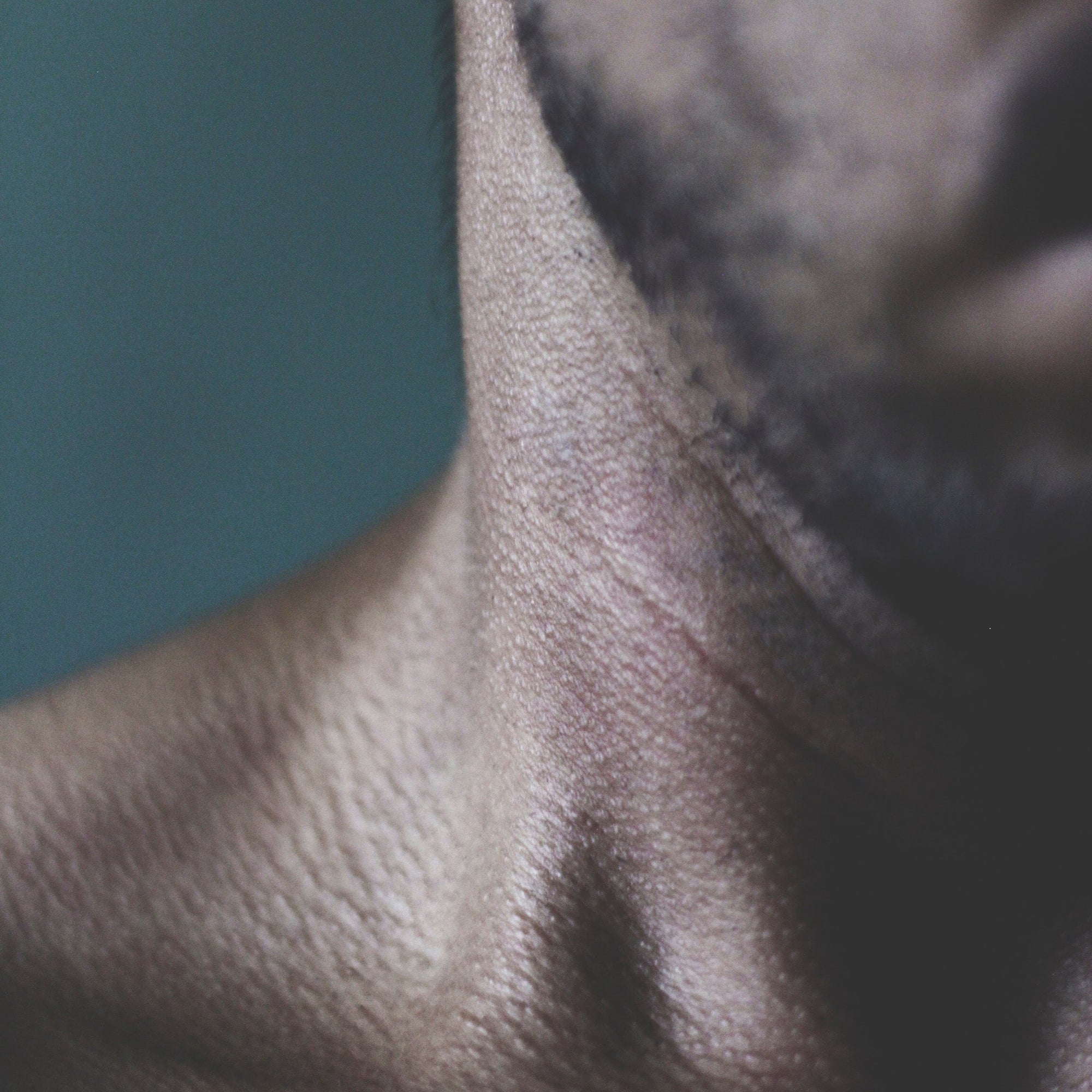For a man, learning how to shave is a real skill, and it's one that's worth perfecting!
And while dragging a blade against your face is never going to be fun, there are two things you can do that go a long way to make shaving smooth and pain-free.
Here’s a quick guide on how to start your day with your clean-shaven face looking smooth and feeling calm.
 A clean-shaven face - looking smooth and feeling calm
A clean-shaven face - looking smooth and feeling calm
We all want a smooth, clear, healthy looking face after shaving.
And you don’t want your clean-shaven look ruined by razor burn, ingrown hairs or razor bumps.
The best thing you can do to avoid this is to use a nourishing, protective shave cream (and of course we would recommend our own Protective Shave Cream!)
But there are two other things that can make all the difference to how good your post-shave skin looks…
Two essential tips for a smooth shave
Here are 2 important things to remember to make sure your shave is friction free.
- Open your pores before you shave
- Use correct razor technique
Let’s start with…
Tip #1: Opening your pores
A smooth shave starts with good prep.
So the first thing to do is splash your face with warm (not hot!) water. This will open up your pores and soften your facial hair, making for a smoother, more comfortable shave with less irritation.
It also allows your hair follicles to relax, letting hair protrude out from the skin, and so making your beard easier to cut.
(The same is true when you use a rich shaving cream. It lifts the hairs away from your face).
So a great time to shave is when you’re taking a shower – or just afterwards. Your skin will stay warm and relaxed throughout the shaving process.
It's the reason that a barber will apply a hot towel to your face before a professional shave.
You can use the same principal yourself at home. Just use a clean, warm wrung out washcloth to gently heat your skin.
The main thing to remember is that we are trying to keep your skin warm, moist and relaxed.
Next you can apply your shaving cream.
And then it’s time to pick up your razor….
Tip #2: Correct shaving technique
Practising a good shaving technique means that you use the razor in a way that won’t irritate your skin. And you can avoid surface redness and razor burn.
It’s worth getting expert advice from your barber as to the best way to shave your particular face and skin type. A lot can depend on the thickness and growth pattern of your beard, and he will be able to instruct you as to the best way to shave for you.
The thing to remember is that it’s important to always shave WITH the grain.
Why shave with the grain?
It’s tempting, we know, to shave against the direction of hair growth for that seemingly closer shave, but it’s not worth the irritation. It will only aggravate your skin and can distort the hair follicles causing ingrown hairs to form.
What is the best way to shave?
A key tip is to apply minimal pressure.
Hold your razor at the very end of the handle, gripping it lightly. Then let the razor do the work. The only pressure applied should come from the weight of the razor.
And use short, confident shaving strokes, whilst avoiding going over the same spot multiple times.
Repeatedly shaving across the same area of your face will result in severe irritation.
It’s the hardest shaving skill to master but cutting every hair without having to repeat a spot is how you avoid cuts, scrapes, and razor rash.
And making quick short strokes on your beard allows for the change in grain direction that happens all over your face.
 Map the direction of hair growth so that you always shave WITH the grain
Map the direction of hair growth so that you always shave WITH the grain
Whatever type of razor you prefer, remember to change the blades often.
The dull, damaged edge of an over-used razor blade will pull against your skin, causing painful redness and razor burn.
Swapping out your blades every 3-4 shaves will ensure an effortless, pain-free cut.
Here’s a quick rundown of your full shaving routine…
ACTION PLAN: Step by step guide for a perfect shave
Follow these steps for a smooth, comfortable shave that is free from irritation - leaving your skin looking smooth and feeling calm.
Step #1 – Prep your skin well. Opening your pores.
Step #2 - Apply a nourishing, protective shave cream
Step #3 – Always shave WITH the grain
Step #4 – Use light, easy strokes
Step #5 – Pat dry gently
Step #6 – Always moisturize post-shave
We’ve got more on the best way to shave here: “SHAVE: 9 tips for a pain free shave”.
A nourishing shave cream is essential.
It will create a rich barrier between your face and the razor.
This will protect your skin and prevent any razor burn. It also provides lubrication for the shaving process itself, softening your beard and helping to maintain your skin's hydration level too.
Protective Shave Cream for Your Smoothest Shave
Our Protective Shave Cream is enriched with moisturizing Glycerin and includes Shea Butter to nourish and protect your skin throughout your shave.
It includes Apricot Stone Oil to soften your beard for easier shaving too.
We've also added Aloe Vera to soothe your skin and purifying Tea Tree Oil to help reduce any redness and irritation.
And like all of our products, our Protective Shave Cream is dermatologist tested, hypoallergenic and non-irritating.
It has also undergone and passed the rigorous European Cosmetic Regulations.
Plus it’s cruelty free.
FAQ’s
What is razor burn?
Razor burn is an irritated redness, accompanied by a stinging sensation, that you can get after shaving your face. If you have sensitive skin, you are probably more susceptible than most to razor burn after shaving.
The irritation is caused by skin being pulled during shaving, and the hair follicles being tugged by the scraping action of the razor blade.
Shave cream vs foaming shave gel?
You want to find a product that’s designed to effectively protect your skin during your shave, and for that you need a protective shaving cream rather than a shaving foam.
A foaming shave gel is just made up of tiny pockets of air that disappear as soon as the razor touches your face. It feels cushion-y and reassuring, but it's not!
Why is shaving cream better?
A nourishing shaving cream will create a protective barrier between your skin and the razor.
This will provide lubrication throughout your shave, softening your beard and keeping your skin hydrated too.
How do I apply shave cream?
Apply a small amount of the cream to your face with your fingers, or with a shaving brush using a circular motion. The shave brush will lift the hairs and coat them more evenly with the shaving cream.
Let the cream sit for two to three minutes, particularly if you have thicker facial hair. This helps the shaving cream really penetrate the hairs and soften them prior to cutting.
If you've been used to a foaming shave cream or shaving soap all of this will feel very strange at first but trust us, it’s the best way to protect your skin and prevent irritation.
Once you experience the results, you’ll see that it’s worth it.
What helps with razor rash after shaving?
Moisturizer.
Keep your skin well hydrated by applying a good quality moisturizer (like our Hydrating Daily Moisturizer) after your shave.
This will help your skin to heal from any razor burn and irritation, and to avoid any dryness. Keeping your skin moisturized will also help to reduce sensitivity.
SHOP THE ROUTINE.
All that you need to keep looking handsome.
PRESTIGE SKINCARE FOR MEN.
MADE IN FRANCE.



